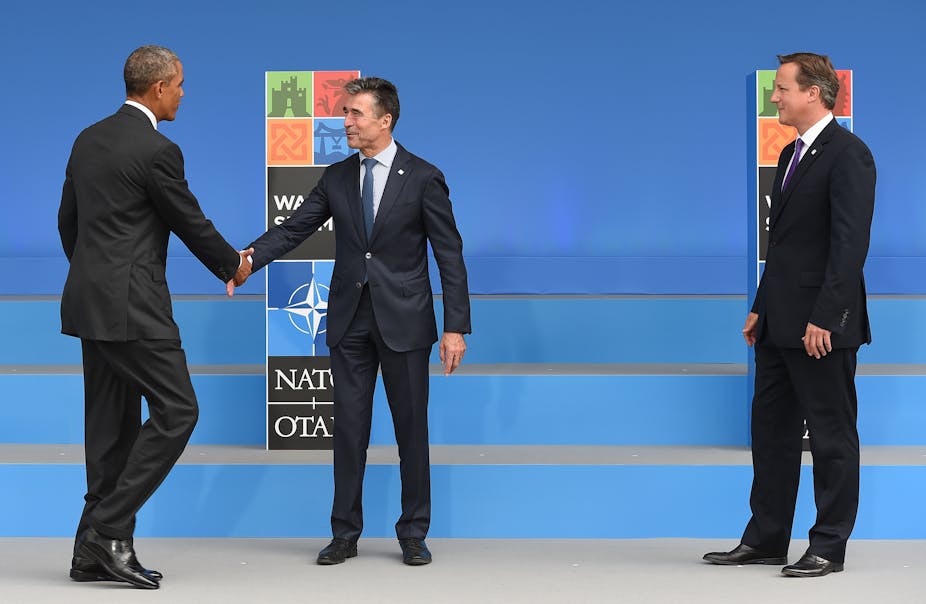After the NATO-led interventions in Kosovo and Libya, many commentators argued that the Responsibility to Protect, the fashionable name for humanitarian military intervention, had finally become an established feature of international security policy.
As a values-led alliance of notionally democratic and human rights-respecting states, NATO at last appeared to be taking a lead on the delivery of humanitarian military solutions both independently and as a key partner of the UN. And with major humanitarian catastrophes now unfolding in the Middle East and north and west Africa, it might be expected that this trend would continue.
But NATO’s 2014 Wales Summit has, quite predictably, focused on more traditional security challenges (the Russian threat to Ukraine) and on building capacity to deal with emerging security threats (such as the challenge posed by Islamic State). This has pushed aside what has bluntly been referred to as “saving strangers”.
In part, this is because the humanitarian value of military intervention is in serious doubt these days; various well-meant recent interventions have thrown up a rash of civil wars, near-state failures and continued human suffering.
But more pressing reasons for the marginalisation of humanitarian military intervention are long-standing issues facing the alliance and its partners.
What works?
NATO has an increasingly limited ability to act as the world’s policeman. While there is still of course some credence for the idea that the rich, developed and secure West has an obligation to help those in need, the idea that military action by NATO is the answer to major humanitarian crises has faded rapidly.
As Karl-Heinz Kamp of the NATO Defence College argued:
Notwithstanding the tragic situation in Syria and despite determination of some NATO members to react to the cruelties committed by the Assad regime [or by Islamic State], there is no military solution at hand which NATO could provide.
Only four of the 28 NATO members are spending the 2% of GDP thought necessary to fund a credible defence budget: the US, the UK, Greece and Estonia. As fiscal austerity continues to bite (seen by many EU members as a serious security threat in itself), the chances of closing this capability and credibility gap any time soon are slim indeed.
If humanitarian intervention were really central to NATO’s self-image, the complexity of delivering effective humanitarian relief would drive it to closer relations with the UN. But instead of becoming the autonomous humanitarian actor some thought it might become after the Kosovo intervention was judged “illegal but legitimate,” the deterioration of relations with Russia has undermined this option.
Even if the summit makes real headway on raising members’ defence spending and developing the capabilities to keep NATO a credible security force for the next decade, the way its capacity is put to work is still unlikely to involve major humanitarian operations of the kind we’ve seen in places like Libya.
Long decline
The alliance’s slowly declining relationship with Russia, which became an official strategic partner to NATO after the Cold War, has reached crisis point; the secretary general has now condemned Russia’s military intervention in Ukraine, and the deputy secretary general has called for NATO to go “back to basics.
That is a resonant phrase indeed; it was the existential threat posed by Russia (or rather, its Soviet precursor) that galvanised the original NATO members into forming an alliance in the first place. And ever since 1990, even in the aftermath of Russian military activities in Georgia, the relevance of the alliance without a genuine threat to the east was routinely questioned (even as recently as 2013).
Ukraine has changed everything. Now, the Russian threat to Europe appears real and pressing once again; Putin’s stubbornness in the face of criticism and sanctions and continued interest in exploiting the Arctic have renewed the USA’s interest in a strong transatlantic alliance. This has pushed the relationship between NATO and Russia back to cold-war enmity, and obscured the humanitarian role that the alliance had begun to adopt in place of its old geopolitical mission.
The continued and direct goading of the West by Islamic State, strategically positioning the caliphate as a direct security threat to NATO members, will keep NATO engaged in the region. But beyond that, as Ambassador Vershbow and Stephen Krasner, explained at Cardiff University on the eve of the summit, the role of NATO outside its members’ territory is to be an off-shore power-balancer, not to directly intervene.
The meetings with Ukraine’s Poroshenko in Newport will shape the future of the alliance like no other summit in recent memory. Burying any strictly humanitarian role NATO might have begun to adopt is just another of the seismic changes it marks.

